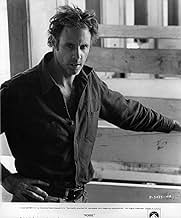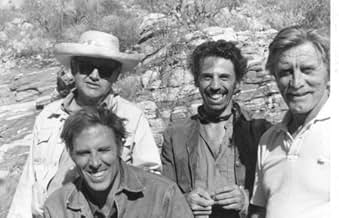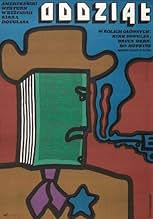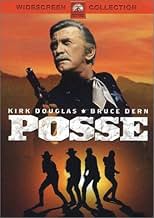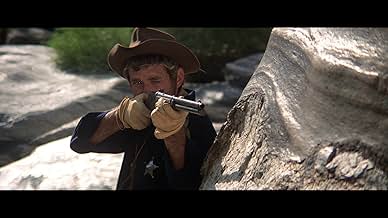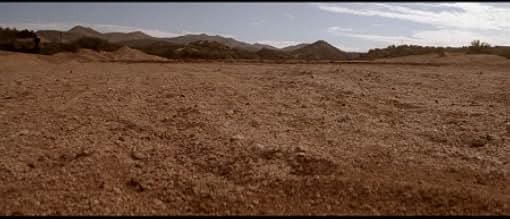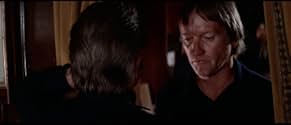ÉVALUATION IMDb
6,5/10
2,6 k
MA NOTE
Ajouter une intrigue dans votre langueAn unscrupulous politico marshal and his deputies chase a gang of train robbers whose leader proves that every man has his price.An unscrupulous politico marshal and his deputies chase a gang of train robbers whose leader proves that every man has his price.An unscrupulous politico marshal and his deputies chase a gang of train robbers whose leader proves that every man has his price.
- Prix
- 1 nomination au total
William H. Burton
- McCanless
- (as Bill Burton)
Avis en vedette
One thing about Kirk Douglas is that he's never been afraid to let the public see him as a bad guy. It's a great tribute to his ability as an actor to develop such a wide range of characters from the heroic Spartacus to the villainous George Brougham in The List of Adrian Messenger.
Posse falls somewhere in the middle of those two films in terms of the good versus evil scale for Kirk Douglas. Politicians running on "law and order" platforms were just coming into vogue at the time and this western is spot on about those kind of politicians and the motivations behind them.
Kirk Douglas is a U.S. Marshal with political ambitions to be a United States Senator. He's got his photographer with him to record his exploits and travels on a private railroad car provided by the railroad.
He's on the trail of outlaw Jack Strawhorn, played by Bruce Dern. Before capturing Strawhorn, Douglas and his posse burn alive Dern's gang in a barn fire and then butcher another group of misfits he's put together even as they want to surrender.
What I like most about Posse is that it doesn't try to make Dern out any kind of a hero. He's an outlaw the way some people are grocers, bakers, shoemakers, etc. This may very well have been Bruce Dern's best screen role.
It turns out that Dern is a far better judge of human nature than the fatuous Douglas is. The town of Tesota, Texas where most of the action takes place is very much sadder and wiser when the film concludes.
A lot of the same themes are covered in the more acclaimed The Unforgiven with Clint Eastwood who also starred and directed himself. But I think Kirk Douglas got there first.
Posse falls somewhere in the middle of those two films in terms of the good versus evil scale for Kirk Douglas. Politicians running on "law and order" platforms were just coming into vogue at the time and this western is spot on about those kind of politicians and the motivations behind them.
Kirk Douglas is a U.S. Marshal with political ambitions to be a United States Senator. He's got his photographer with him to record his exploits and travels on a private railroad car provided by the railroad.
He's on the trail of outlaw Jack Strawhorn, played by Bruce Dern. Before capturing Strawhorn, Douglas and his posse burn alive Dern's gang in a barn fire and then butcher another group of misfits he's put together even as they want to surrender.
What I like most about Posse is that it doesn't try to make Dern out any kind of a hero. He's an outlaw the way some people are grocers, bakers, shoemakers, etc. This may very well have been Bruce Dern's best screen role.
It turns out that Dern is a far better judge of human nature than the fatuous Douglas is. The town of Tesota, Texas where most of the action takes place is very much sadder and wiser when the film concludes.
A lot of the same themes are covered in the more acclaimed The Unforgiven with Clint Eastwood who also starred and directed himself. But I think Kirk Douglas got there first.
Bet you didn't know that Kirk Douglas took the director's chair a couple of times, POSSE being one of them. If you like westerns, like me, you'll probably find this decent. The movie does suffer from the middle third of the movie, where the story pretty much grinds to a halt. Though this part wasn't really boring, it will probably make you wish they would get on with it. Also, the actions taken by certain characters near the end, though having some justification, didn't seem to have enough justification.
On the positive side, POSSE is well shot, well acted, good production values, and an interesting ending. It's worth seeing.
P.S. - Leonard Maltin's description of this movie isn't exactly how the movie plays.
On the positive side, POSSE is well shot, well acted, good production values, and an interesting ending. It's worth seeing.
P.S. - Leonard Maltin's description of this movie isn't exactly how the movie plays.
The outlaw Jack Strawhorn (Bruce Dern) is betrayed by one of his men, Pensteman (David Canary), after robbing US$ 40,000.00 from a train. During the night, his gang is ambushed in a barn by Marshal Howard Nightingale (Kirk Douglas) and his posse that set fire on the place, burning the criminals and the money, but Strawhorn escapes from the attack. He heads to Tesota, Texas, where he kills Pensteman and the local sheriff. Meanwhile, the ambitious Marshal Nightingale that is running for the senate is traveling by train with his posse to Tesota, expecting to capture Strawhorn to help him to win the elections. Nightingale succeeds in his manhunt and poses of hero, but while Strawhorn is in the jail, he poisons the posse asking what will happen with them after the election of their boss. During the transportation of Strawhorn for judgment by train, the outlaw reverts the situation and captures Nightingale. Now he demands the same amount he lost in the fire to release Nightingale and the posse force the locals to give the money to rescue the marshal.
"Posse" is a western with a cynical and amoral tale of leadership, disloyalty and greedy. The twist in the very end is totally unexpected and all the characters are despicable and disloyal with no exception. Marshal Howard Nightingale is probably the worst, with all the characteristics that politicians usually have. James Stacy lost his left arm and left leg when he was riding a motorcycle with his girlfriend and they were struck by a drunk driver that also killed his girlfriend. My vote is seven.
Title (Brazil): "Ambição Acima da Lei" ("Ambition above the Law")
"Posse" is a western with a cynical and amoral tale of leadership, disloyalty and greedy. The twist in the very end is totally unexpected and all the characters are despicable and disloyal with no exception. Marshal Howard Nightingale is probably the worst, with all the characteristics that politicians usually have. James Stacy lost his left arm and left leg when he was riding a motorcycle with his girlfriend and they were struck by a drunk driver that also killed his girlfriend. My vote is seven.
Title (Brazil): "Ambição Acima da Lei" ("Ambition above the Law")
Released in 1975, "Posse" is a Western starring Kirk Douglas and Bruce Dern. Douglas plays, Nightingale, a marshal campaigning for the Senate in West Texas while Dern plays Strawhorn, a notorious outlaw leader whom Nightingale wants to bring in to increase his chances of winning the election. Bo Hopkins is on hand as one of the marshal's deputies while James Stacy plays a newspaper editor who opposes the marshal's campaign.
The movie debuted a year after Nixon resignation due to the Watergate scandal and "Posse" takes advantage of the public's loss of trust in politicians. Nightingale (Douglas) and his deputies are juxtaposed with Strawhorn (Dern) and his losers. There's no overt message, however, until the last 20 minutes. Speaking of which, the twist of the climax initially turned me off and filled me with disgust. But, after reflecting on it, I saw what the movie was getting across and respected it. It's just that the way the message is conveyed is awkwardly implemented. It could've been done more smoothly.
Some critics mistake the film's message as comparing a (supposedly) corrupt politician with a (supposedly) honest lawbreaker, but this is inaccurate. For one thing, "honest lawbreaker" is an oxymoron, particularly where Strawhorn is concerned. Right out of the gate the movie plainly shows him to be a murderous thug and, while a smooth-talker, he's never made out to be the good guy. He's a scumbag criminal worthy of hanging, impure and simple. Nor is Nightingale shown to be wickedly corrupt. He's a commanding marshal of the territory, which is a good thing; he has political aspirations and ties to the railroad, so what? Even when tempted by the blonde hottie Mrs. Ross (Beth Brickell) he charmingly turns her down on the grounds that it wouldn't be advantageous. Isn't that what wisdom is-having the scruples to recognize and deny foolish, immoral or destructive desires/behaviors? For more insights on the message of the movie remember that the film is called "Posse." See below for details.
Beyond the movie's message, "Posse" is a competent, entertaining Western with interesting characters, a quality cast and quite a bit of action.
The film runs 92 minutes and was shot in Sabino Canyon, Florence, Sonoita, Aravaipa Canyon and Old Tucson, Arizona.
GRADE: B-/C+
***SPOILER ALERT*** (Don't read further if you haven't seen the movie)
I didn't find the deputies' sudden shift to the life of outlawry to be believable. True, they would each have $6000, which would've taken three years for them to make doing honest work, but it wasn't like this was enough moolah to radically change their lives, not to mention they'd lose the prestige that came with being deputies; and the possibility of becoming marshals or sheriffs one day. No matter how you slice it, this was an awkwardly implemented twist and lowers my grade of the film.
That said, there were signs that the 'posse' were already bad (with the exception of one deputy who refused to betray Nightingale and turn to crime). For instance, at least three of them are shown secretly bedding some young babes from the town in a conveniently available boxcar. These nubile ladies were obviously attracted to the "bad boys," which just so happen to be 'upstanding deputies,' members of the brave posse. What else is new?
So what's the movie saying? The line between respectable profession and outlawry can be very thin. People can be in an honest occupation and be corrupt; they're essentially just masquerading. It happens everywhere all the time. One critic lambasted the film for it's "tortuous confusion of good and evil." Actually, the movie just sheds light on the existence of evil in places where people naively pull the wool over the eyes not to see it. Look no further than HeyLIARy.
What about Nightingale? Was he shady or just his men? I personally don't think he was. He struck me as an ambitious justice-seeking marshal with political ambitions and he refused to even consider an illicit sexual liaison. But it's not a good reflection on his character that the majority of his men were corrupt, so maybe he was too, at least a little; and it would overtly manifest down the line in office.
Despite my criticisms, any movie that can spur such questions is worth checking out.
The movie debuted a year after Nixon resignation due to the Watergate scandal and "Posse" takes advantage of the public's loss of trust in politicians. Nightingale (Douglas) and his deputies are juxtaposed with Strawhorn (Dern) and his losers. There's no overt message, however, until the last 20 minutes. Speaking of which, the twist of the climax initially turned me off and filled me with disgust. But, after reflecting on it, I saw what the movie was getting across and respected it. It's just that the way the message is conveyed is awkwardly implemented. It could've been done more smoothly.
Some critics mistake the film's message as comparing a (supposedly) corrupt politician with a (supposedly) honest lawbreaker, but this is inaccurate. For one thing, "honest lawbreaker" is an oxymoron, particularly where Strawhorn is concerned. Right out of the gate the movie plainly shows him to be a murderous thug and, while a smooth-talker, he's never made out to be the good guy. He's a scumbag criminal worthy of hanging, impure and simple. Nor is Nightingale shown to be wickedly corrupt. He's a commanding marshal of the territory, which is a good thing; he has political aspirations and ties to the railroad, so what? Even when tempted by the blonde hottie Mrs. Ross (Beth Brickell) he charmingly turns her down on the grounds that it wouldn't be advantageous. Isn't that what wisdom is-having the scruples to recognize and deny foolish, immoral or destructive desires/behaviors? For more insights on the message of the movie remember that the film is called "Posse." See below for details.
Beyond the movie's message, "Posse" is a competent, entertaining Western with interesting characters, a quality cast and quite a bit of action.
The film runs 92 minutes and was shot in Sabino Canyon, Florence, Sonoita, Aravaipa Canyon and Old Tucson, Arizona.
GRADE: B-/C+
***SPOILER ALERT*** (Don't read further if you haven't seen the movie)
I didn't find the deputies' sudden shift to the life of outlawry to be believable. True, they would each have $6000, which would've taken three years for them to make doing honest work, but it wasn't like this was enough moolah to radically change their lives, not to mention they'd lose the prestige that came with being deputies; and the possibility of becoming marshals or sheriffs one day. No matter how you slice it, this was an awkwardly implemented twist and lowers my grade of the film.
That said, there were signs that the 'posse' were already bad (with the exception of one deputy who refused to betray Nightingale and turn to crime). For instance, at least three of them are shown secretly bedding some young babes from the town in a conveniently available boxcar. These nubile ladies were obviously attracted to the "bad boys," which just so happen to be 'upstanding deputies,' members of the brave posse. What else is new?
So what's the movie saying? The line between respectable profession and outlawry can be very thin. People can be in an honest occupation and be corrupt; they're essentially just masquerading. It happens everywhere all the time. One critic lambasted the film for it's "tortuous confusion of good and evil." Actually, the movie just sheds light on the existence of evil in places where people naively pull the wool over the eyes not to see it. Look no further than HeyLIARy.
What about Nightingale? Was he shady or just his men? I personally don't think he was. He struck me as an ambitious justice-seeking marshal with political ambitions and he refused to even consider an illicit sexual liaison. But it's not a good reflection on his character that the majority of his men were corrupt, so maybe he was too, at least a little; and it would overtly manifest down the line in office.
Despite my criticisms, any movie that can spur such questions is worth checking out.
On screen I find Kirk Douglas to be without peer, but I have come to admire him as much if not more for his real-life advocacy of some highly unorthodox, yet worthy projects.
If this movie doesn't rank among his very best, it is still remarkable for how unapologetically it goes against the grain and makes a very bold personal statement (one that was not so popular at the time but resonates to this day). All the while he is producing and directing himself in what proves to be a rather unflattering role. I can't think of anyone else who would have the real-life grit to do such a thing - Kirk Douglas has done so repeatedly with aplomb.
If this movie doesn't rank among his very best, it is still remarkable for how unapologetically it goes against the grain and makes a very bold personal statement (one that was not so popular at the time but resonates to this day). All the while he is producing and directing himself in what proves to be a rather unflattering role. I can't think of anyone else who would have the real-life grit to do such a thing - Kirk Douglas has done so repeatedly with aplomb.
Le saviez-vous
- AnecdotesThis movie was the first role for James Stacy following his 1973 motorcycle accident in which he was hit by a drunk driver, resulting in the loss of his left arm and left leg. Kirk Douglas created the role especially for Stacy.
- GaffesUS Senators were not directly elected at the time of the film's setting. They were appointed by State Legislatures until the 17th Amendment in 1913.
- Citations
Jack Strawhorn: Every day above ground is a good day.
- ConnexionsReferenced in Talking Pictures: Allan Warnick, Supporting Actor in 'Chinatown' (2022)
- Bandes originalesI've Been Working on the Railroad
(uncredited)
Traditional
The first line is sung during Nightingale's speech
Meilleurs choix
Connectez-vous pour évaluer et surveiller les recommandations personnalisées
- How long is Posse?Propulsé par Alexa
Détails
Box-office
- Budget
- 2 000 000 $ US (estimation)
- Durée1 heure 32 minutes
- Mixage
- Rapport de forme
- 2.35 : 1
Contribuer à cette page
Suggérer une modification ou ajouter du contenu manquant

Lacune principale
By what name was La brigade du Texas (1975) officially released in India in English?
Répondre

